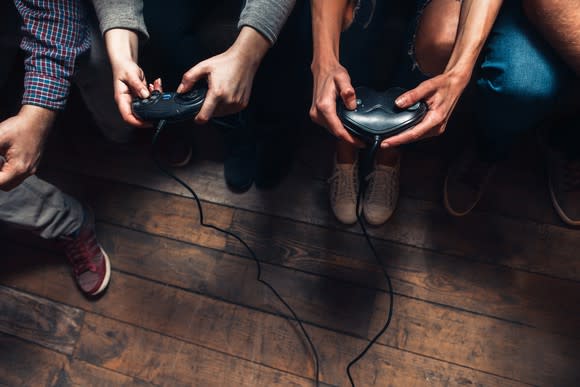Ubisoft Stock Is Up 400% Over the Past Three Years. Is It Still a Buy?
Ubisoft (NASDAQOTH: UBSFF) doesn't get the attention of its larger U.S.-based peers, but everything that is driving the strong stock performance of Activision Blizzard (NASDAQ: ATVI), Electronic Arts (NASDAQ: EA), and Take-Two Interactive (NASDAQ: TTWO) is also benefiting the Paris-based game maker. Ubisoft is home to the popular Assassin's Creed and Far Cry franchises, among others.
The good times for Ubisoft were under threat last year as Vivendi (which used to own a controlling stake in Activision) was reportedly seeking a controlling stake in it. But Ubisoft -- founded in 1986 by the Guillemot brothers, who collectively own 18.5% of the company's stock -- recently reached an agreement in which Vivendi will sell its entire 27.3% stake in the game maker.
With Vivendi out of the way, Ubisoft is wasting no time in pursuing its growth strategy.

IMAGE SOURCE: GETTY IMAGES.
Ubisoft is on the move
On March 20, the same day as the Vivendi news, the company announced an important partnership with Chinese tech giant Tencent Holdings (NASDAQOTH: TCEHY). This positions Ubisoft for growth in the largest and fastest-growing video game market in the world. Investors should note that Tencent took a small stake (less than 1%) in Ubisoft in return for helping Ubisoft buyout Vivendi's share ownership.
The Tencent partnership is a huge win for Ubisoft. More than 500 million Chinese gamers spend the majority of their money on local games developed in China, which means foreign companies who want to tap this fast-growing $32 billion game-spending market need to have a local partner in order to have success. Since Tencent is the largest game company in the world, and has the largest online gaming community in China, Ubisoft couldn't ask for a better partner to penetrate this enormous video game market.
Ubisoft announced that Tencent will "operate, publish and promote several of Ubisoft's most successful titles on PC and mobile in the Chinese market. The deal strengthens ties between one of the world's leading videogame developers and the largest operator of online games and social networks in China."
Ubisoft also announced two new studios it is opening in Ukraine and India to work on big-budget games. Microsoft, Activision, Tencent, and Take-Two have all purchased European game studios in the last few years. The reason is that European game makers have built a reputation of innovation, as well as success in marketing their games outside of Europe. So, by opening a new studio in Ukraine (a country known for its advanced computer skills) Ubisoft is expanding its reach to bring into its fold greater game development talent.
A similar reason applies to the new studio opening in India. Like China, India has a booming video game market, and this new studio is a way for Ubisoft to get closer to top technology schools locally in order to train and hire the best programming talent that caters to the tastes of gamers in India.
Ubisoft also acquired two studios in the last month. One is 1492 Studio, which makes free-to-play and interactive story-based games for mobile. The other one is Blue Mammoth Games, which makes a game called Brawlhalla -- the most played fighting game on Steam -- the leading online game store for PC gamers.
These studios join Ubisoft's other mobile game studio, Ketchapp, as well as the company's mobile game called Growtopia -- both were purchased in fiscal 2017 and marked Ubisoft's first entrance in the fast-growing $50 billion mobile game market. Both acquisitions are expected to be immediately accretive to Ubisoft earnings.
Is Ubisoft stock a buy?
Ubisoft stock is up roughly 400% over the past three years, which has driven the stock's P/E ratio to an expensive-looking 60 times trailing earnings. However, Ubisoft expects strong growth in revenue and earnings over the next year. Its early guidance for fiscal 2019, which ends in March 2019, calls for operating income to grow 63% to 440 million euros ($539 million at current exchange rates). This high expected growth makes the stock's P/E ratio look not so expensive.
Looking at it another way, Ubisoft may actually be a better buy than its U.S.-based rivals based on the price-to-sales ratio, which simply compares a stock's market cap to total revenue. Take a look at the table below, which compares these industry stalwarts on a P/S basis.
Metric | Ubisoft | Activision | Electronic Arts | Take Two |
|---|---|---|---|---|
P/S ratio | 4.59 | 6.97 | 7.13 | 5.62 |
Market cap | $9.32 billion | $48.89 billion | $36.35 billion | $10.75 billion |
Data source: Yahoo Finance!
All of these companies are pursuing the same growth opportunities in esports and all have a roster of best-selling big-budget games to their credit. Ubisoft clearly has a growth strategy in place to innovate with new games, and expand into esports and mobile gaming, which are big growth opportunities for game companies right now.
Given positive trends in the gaming industry, I wouldn't be afraid of buying Ubisoft at recent highs. The video game industry is growing -- Newzoo estimates the industry to grow 8% per year through 2020 -- and with Ubisoft opening itself up to the fast-growing China market and showing interest in expanding its horizons with the new studios, Ubisoft is very much on the move, so, in my view, the stock still looks like a buy.
More From The Motley Fool
Teresa Kersten is an employee of LinkedIn and is a member of The Motley Fool's board of directors. LinkedIn is owned by Microsoft. John Ballard owns shares of Activision Blizzard. The Motley Fool owns shares of and recommends Activision Blizzard, Take-Two Interactive, and Tencent Holdings. The Motley Fool recommends Electronic Arts. The Motley Fool has a disclosure policy.

 Yahoo Finance
Yahoo Finance 